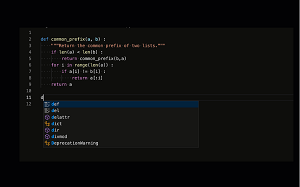News
VS Code v1.75 Released with New AI Tools Documentation
The January 2023 update to Visual Studio Code (v1.75) introduces new documentation for using AI tools in the super-popular, open source-based, cross-platform code editor.
As of now, the new AI Tools in VS Code documentation only features one product, as introduced in the dev team's update announcement: "We've also added a new AI Tools in VS Code topic to the VS Code documentation that will help you get started with Copilot."
That would be GitHub Copilot, to be specific, described as an "AI pair programmer." It shook up the development world last year with a large-scale machine language model called Codex from Microsoft partner OpenAI that's capable of generating working code in response to natural language inputs.
"The GitHub Copilot extension is an AI-powered code completion tool that helps you write code faster and smarter," the dev team said in the v1.75 post. "You can use the Copilot extension in VS Code to generate code, or to learn from the code it generates. GitHub Copilot integrates into the VS Code editor through the inline suggestions UI, which lets you review various suggestions and easily accept all or part of the generated code."
 [Click on image for larger, animated GIF view.] Copilot in Animated Action in VS Code (source: Microsoft).
[Click on image for larger, animated GIF view.] Copilot in Animated Action in VS Code (source: Microsoft).
That tool in the Visual Studio Code Marketplace has been installed more than 3.5 million times, earning an average 3.8 rating (scale 0-5) from 807 developers who reviewed it.
"GitHub Copilot provides autocomplete-style suggestions from an AI pair programmer as you code," the extension description says. "You can receive suggestions from GitHub Copilot either by starting to write the code you want to use, or by writing a natural language comment describing what you want the code to do."
The team also pointed to the recent debut of Copilot for Business, which provides simple license management, organization-wide policy controls and privacy for $19 per user per month (the individual plan costs $10/month).
Other updates in the new release were neatly summarized:
- Profiles - Create and share profiles to configure extensions, settings, shortcuts, and more: "A Profile can include extensions, settings, keyboard shortcuts, UI state, tasks, and user snippets."
- VS Marketplace signing - Published extensions now code signed by default: "When a user installs a signed extension through VS Code's Extensions view, VS Code will verify the signature, and thus prove that the extension is indeed coming from the VS Marketplace and that the extension package has not been modified."
- Accessibility improvements - Terminal screen reader mode, new keyboard shortcuts: Also diff navigation improvements terminal accessibility help and improved keyboard navigation on Settings editor indicators.
- Easier multi-view resizing - Drag layout corners to resize multiple views at once: "You can now resize multiple views at the same time by dragging the corners of the views."
- Tree view search history - Quickly rerun previous searches in tree views: "The Find control inside tree views now supports history navigation. You can use the Up/Down arrow keys to navigate through the history of your previous searches."
- Better Terminal link detection - Detect links containing spaces, brackets, line and column formats.
- New Git commands - Stash staged changes and delete remote tags from within VS Code: "This new mode allows you to easily stash only the changes that are staged."
- Dark+ and Light+ V2 themes - Try the experimental color themes and let us know what you think: "These themes are an evolution of the existing Dark+ and Light+ themes, and are designed to be more accessible and make VS Code look better than ever!"
- Jupyter Notebook topics - Using notebooks on the web, how to manage Jupyter kernels: There are two new topics for working with Jupyter Notebooks in VS Code:
About the Author
David Ramel is an editor and writer at Converge 360.